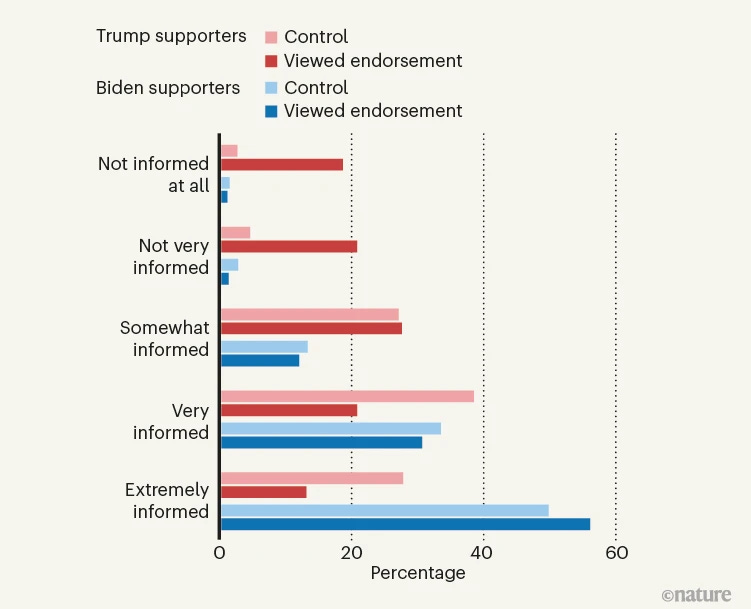Should Scientific Organizations Endorse Political Candidates?
Only if they want to damage trust in science

With the U.S. election hurtling toward us, the issue of whether institutions should endorse political candidates is once again a topic of discussion.
Until recently, scientific organizations largely stayed out of the endorsement game. In recent years, however, they’ve started dabbling in it. In 2020, for instance, Nature magazine - one of the most revered journals in science - endorsed Joe Biden for U.S. president.
Was this a good idea? That’s the question that inspired an important 2023 paper by economist Floyd Zhang. In a large, pre-registered experiment, Zhang explored reactions to the Biden endorsement - and what he found was bad news for its fans.
The endorsement, concluded Zhang, didn’t change people’s view of the candidates. But what it did do was change people’s view of Nature and of scientists in general. Specifically, it led them to lose trust in both.
Some of the key results are shown in the graph below, which comes from an article in Nature covering Zhang’s work.

Zhang’s findings were recently replicated by an independent research team. They also mesh nicely with research by Cory Clark and colleagues, showing that the politicization of institutions undermines people’s faith in those institutions, even among individuals who share the same political views.
The available evidence suggests, then, that it’s probably a bad idea for non-political organizations to endorse political candidates.
Unfortunately, however, this is a lesson that might go unheeded. The response of Nature’s editors, at least in the immediate aftermath of the Zhang paper, was to double down. “Political endorsements,” they noted, “might not always win hearts and minds, but when candidates threaten a retreat from reason, science must speak out.”
Given, though, that speaking out apparently makes no political difference, and that it only seems to erode trust in science, a more reasonable conclusion might be that “science” should not speak out. Of course, individual scientists have every right to take any political stand they wish. However, politicizing scientific institutions seems to be a counterproductive move - unless, that is, your secret agenda is to harm the credibility of science.
You can read Nature’s endorsement here.
You can read Zhang’s paper here.
You can read the Nature piece on Zhang’s paper here.
And you can read Clark and co.’s paper here.
Follow Steve on Twitter/X for more psychology, evolution, and general science.
How You Can Support the Newsletter
I love writing the Nature-Nurture-Nietzsche Newsletter - but it’s a lot of work! If you want to support my efforts to bring you non-politicized psychology, there are several ways you can do it.
Like and Restack - Click the buttons at the top or bottom the page to boost the post’s visibility on Substack.
Share - Send the post to friends or share it on social media.
If You Can Afford It, Upgrade to a Paid Subscription - A paid subscription will get you:
Full access to all new posts and the archive
Full access to exclusive content such as my “12 Things Everyone Should Know” posts, Linkfests, and other regular features
The ability to post comments and engage with the N3 Newsletter community.
If you could do any of the above, I’d be hugely grateful. It’s the support of readers like you that makes this newsletter possible.
Thanks!
Steve


Agree! Vote as a citizen but stay above the fray as a scientist.